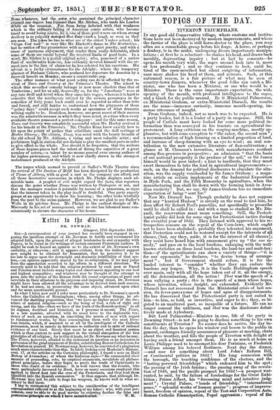Itttli ta 14t nitur.
WEIT31.1.N.
Glasgow, 17th September 1851. San—A correspondent of your journal has recently. been engaged in ex- posing the insidious attempt of ,lit. Newman to fortify and recommend his adopted faith, upon the ground Of alleged tendencies to and sympathy with Popery, to be found in the Writings of certain eminent Protestant authors. It might be rash to hazard an 'opinion as to the extent of Dr. Newman's own credulity, or otherwise; still it appears evident, from the indirect support now sought to be obtained for P,onianism, that he perceives to be too late to argue upon the downright and dogmatic infallibility of that sys- tem,—an opinion apparently shared by his co-religionists, if we may judge from the approbation accorded to his efforts in a different direction. We scarcely need to be told that the religion professed by such men as Pascal and Fenelon Must include many topics and observances appealing to our best and highest sympathies; an.d whatever may be thought of the attempt to press into the service of the Boman faith the casual expressions of poets and their novelists in ei allusions to its gorgeous and imposing ritual, Dr. Newman might have been ,allowed all the advantage to be derived from such sources, if he had not since,, in prosecuting the same object, advanced upon other and far more questionable ground. In what I have now said I refer, more particularly to Dr. Newman's speech i before the Catholics of Birmingham; when, among other things, he ad- vanced the startling proposition, that " we have no higher proof of the doc- trines of natural religion—such as the being of God, a rule of right and wrong, and the like—than we have of the truth of theltomish system," in all its dogmas, doctrinal and historical, as I presume is meant. The Times, in a late number, adverted with its usual force to the deplorable ten- dency of such an assertto* n, in unsettling the minds of men with regard to fundamental truths; by thus commingling them with the most frivo- lous details, which,.if assented to at all by the intelligent of the Catholic persuasion, must be merely in deference to authority and in spite of rational evidence of any kind. Surely that must be an abject and besotted system which is thus content to seek support in the virtual abnegation of the first principles of all religion' for to this it leads, let Dr. Newman say what he may. '..0he Times, moreover, alluded to the statement in question as an inversion or perversion of the great argument of Butler, substituting Roman Catholicism for Revelation in general. Dr. Newman may, however,he convietedof a plagiariam much more characteristiethen this. In lately looking over Mosheimra History, cent. 17, at the articles on the Carteeitin philosophy, I found a note on Huet Bishop of Ayranehes; of whom the historian says—" He commended their manner of eroceeding, who by sceptical arguments, invalidate all philoso- phical principles, before they begin to prove the truth of Christianity to those who 'doubt of its evidence. It is well known that the Jesuits, who were particularly -favoured-by Huet, have on many occasions employed this method to throw dust into the eyes of the Protestants, and thus lead them blindfold into the Itomish communion." It thus appears, that although Dr. Newman may not be able to forge his weapons, he knows well in what ar- moury to find them. I beg to recommend this subject to the consideration of the intelligent correspondent referred to it the beginning of my letter ; who, with your per- mission, maybe able to do good service by exposing further the false and pemicious.principle on wUr..kItove aoimadvertbd: ' 'W. M.


























 Previous page
Previous page